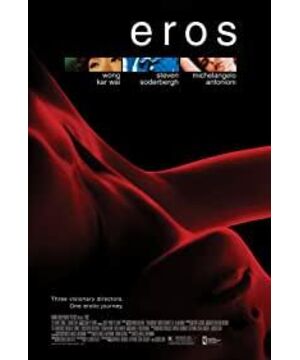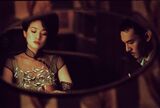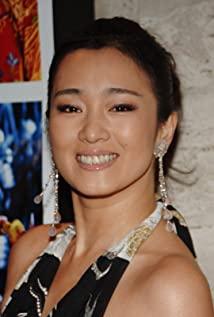Slowly shaking shots, flickering light, exotic and psychedelic whispers, paired with pictures depicting the love between men and women, naturally make people connect the film with the title eros: illusory illusion , intertwined with lingering sex and love.
Sound first, goodbye picture. The opening is a flashback. Although the dialogue between the male and female protagonists is small, the meaning is profound. The pattering rain has rendered a gloomy and lonely atmosphere, and the soulful and forbearing male protagonist in the gloomy Tongzilou. The shots are all frontal close-ups of the male protagonist, and the female protagonist only hears his voice and never sees him in this dialogue. It is worth mentioning that this part is repeated at the end of the film, the difference is that the reaction scene of the heroine is added, which produces a new chemical effect and brings the film to a climax.
"Do you still remember the first time we met?"
"Remember."
"Remember my hand?"
"Remember."
Yu Bai immediately fell into memory, and the old record in the 1960s gramophone explained the background of the story. In this episode, the space outside the painting is boldly used, and the important element of the voice-over is combined in it, so that the inside and outside of the painting complement each other, showing the audience a multi-level three-dimensional space. This is the first time for Xiao Zhang to go to Miss Hua's house. He is waiting at the table, and there is a large voice-over. The space in the fixed camera is tight and the tone is gray, but the sound of love in the room has expanded. The space adds to the aftertaste, and when Xiao Zhang got up and went to Miss Hua's room, the camera didn't follow him, but just faced the wallpaper and the flowers on the table, delaying to cut to the two parties who were talking, so persistently using the off-screen The space makes people pay more attention to the environment, and at the same time has more room for imagination of the relationship between the two, and reduces the switching of shots, so that the rhythm of the film will be very low and flat. The clip sets the scene. In addition, the background music "Good Spring Night" and the sound of love in the room all imply Miss Hua's identity - a courtesan with a variety of styles, which paved the way for the appearance of "hand" in the following text.
"Hand" is the clue that runs through the whole text, and it is also the emotional bond between the two people. In the film, Miss Hua masturbates for Xiao Zhang twice. The beginning and the end of the story, the difference in status and situation, from the beautiful to the sad, from the gorgeous to the defeat, the characters are full of tension. For an excellent film work, its theme is not directly told to the audience, but implied in every detail, and it is up to the audience to experience it. "Hand of Eros" uses metaphorical montage and repetitive montage techniques to convey the theme of the film implicitly and naturally. It not only expresses the emotional changes of the hero and heroine, but also hints at the real status quo of Hong Kong society in the 1960s, giving the film the color of the times. And social significance, enhance the artistic value of the film, while deepening the theme of the idea, it has a subtle beauty in expression.
The abrupt end of the old record heralded the switching of the camera and the transfer of the scene, and then the young and ignorant Xiao Zhang appeared in the camera. Miss Hua's commanding tone made Xiao Zhang take off his pants.
"How can a woman be a tailor before?"
"Maybe you will make me clothes in the future."
"Remember how you feel today, you will make me clothes look good in the future."
Starting from taking off his pants, Xiao Zhang Not a word was said. The picture is handed over to the intimate contact between the hands and the body. The deep breathing and the expression of pain but unable to break free fully depict Xiao Zhang's innocence. Miss Hua gave Xiao Zhang a different touch with her hand, and it also made Xiao Zhang remember her and her hand forever. She is not only Xiao Zhang's sexual enlightener, but also the white moonlight in front of the window that Xiao Zhang could never touch in his life.
Xiao Zhang appeared in the camera again, and it was very different from before. To be precise, he transformed from a boy into a man. Those youthful and ignorant turned into mature and stable, the only constant is the share of forbearance love.
The quarrel in the room next to Miss Hua, the panting, or the conversation with the other end of the phone, through accurate performance and scene scheduling, successfully created a visual closure and an auditory transition.
In the film, Xiao Zhang doesn't have too many lines, and he always keeps his head down. In the close-up of several faces, he seems to be hesitant to say anything, and then he quickly lowers his head. He has been trying his best to suppress his feelings, and even in the face of Miss Hua's unbridled provocation, he can control himself very well, with almost no special expressions, just saying, ok, I know, ok. This kind of control is that he knows himself, the other party, and the ending of the two. So he knows how to control, he must control, even if the feelings and desires are tormenting him like fire, even if he can only touch Miss Hua's clothes in the middle of the night to comfort her, but he still has to be nice to her, love, I don't know why, Go deep.
Miss Hua knew from the very beginning that the eyes he cast towards her had a different temperature, different from those of the men around her. That kind of temperature made her fearful and addicted for a while. She was a woman who had never experienced love. She knew that using men to survive, she would eventually be abandoned by men. She indulged, because she was desperate, and the appearance of Xiao Zhang did not bring any money or interest, and it had nothing to do with any transaction. When love is approaching, she is so preoccupied with gains and losses. She was deliberately hot and cold to him, she sometimes teased him, sometimes she insulted him, she tortured him because she resented their identities with each other-they were bound to die.
Miss Hua's later fall, she had always expected that when everyone ignored her, only he would still visit her immediately after receiving her call, and he would not be able to earn any more money from her later. For a penny, he knew that she would never have the money to make those precious and beautiful clothes, but he had no turning back. On a rainy night, he was standing in the dark corridor of a dilapidated hotel, listening to the voice of his beloved woman having sex with a low-class man. The picture was dark and melancholy, and he was sad but powerless.
The end of the film, the beginning of the sympathy. She stretched out her pale hand, her beautiful face like flowers in the past had withered, she said, she can't repay him, now there are only these hands, if he doesn't dislike it... Such innocence has nothing to do with lust. Their last unforgettable kiss was real, it was the outburst of a long-suppressed relationship, and it was desperate. Their respective identities were already doomed to such an ending, because he could not and could not take her away, he could only watch her destruction with his own eyes, and she had no complaints. For a woman like her, there was still someone to accompany her when she died, and she had no regrets.
Speaking of "The Hand of Eros", I have to mention "In the Mood for Love", the two films have the same purpose. First, the implicit beauty of the film's thematic performance. The implicit expression enriches the connotation of the work of art and makes the theme of the whole work more charming and memorable. The two films have such artistic features. Director Wong Kar Wai uses a metaphorical and symbolic expression to add an inner flair to the two films. Like a hazy poem, every word, including every punctuation, has its symbolic meaning, and it is also like a freehand painting, with every line implying a metaphor. The use of distinctive metaphors and symbolic expressions makes this work both implicit and profound in the expression of the theme. Second, the conciseness of the narrative form reinforces the theme. "A film is born to tell a story, or a film exists because of a story." Like novels, characters and plots are essential and important elements of a film. In general, a twisted storyline and rich characters attract the audience the most. In the two films, Wong Kar-wai narrates the stories with highly simplified plots, highly omitted characters, and extremely refined character dialogues. The style is a bit like the narrative features of the French New Wave films that play down the plot and downplay the characters. The effect of this narration form is that the whole film is concise and concise, which plays a role in highlighting the theme, making people feel that there is no superfluous element in the narration process of the film, and every detail has a close relationship with the theme. Thirdly, both films portray a love that cannot but cannot be separated. Whether it was Xiao Zhang and Miss Hua or Su Lizhen and Zhou Muyun, that forbearance and passionate love could never break through the barriers of worldly vision and break free from the shackles of different identities. Fourth, the director's unique cheongsam aesthetics. Miss Hua and Su Lizhen both wore cheongsams. From beginning to end, they used the cheongsam to outline the various expressions of the characters, giving the cheongsam a different meaning.
The refined lines, shaky footage, strong colors, diverse musical styles, and inner monologues and silent choking full of narcissism and ego in Wong Kar-wai's films, those sound or silent images impact people's fragile emotions all the time. The gate, venting those helpless emotions and a touch of sadness. With extremely stylized visual images, unique narrative style, post-modern expression and keen grasp of urban people's ethos, his works have successfully constructed a unique "Wong Kar-Wai-style" film aesthetics.
View more about Eros reviews











